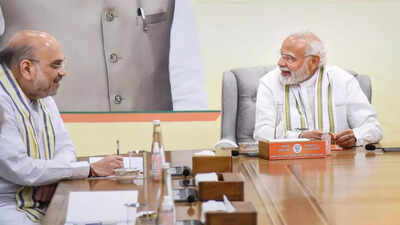Top Searches
- News
- India News
- Day after SC clean chit, Amit Shah hails PM Modi, hits out at Teesta Setalvad
Day after SC clean chit, Amit Shah hails PM Modi, hits out at Teesta Setalvad

Prime Minister Narendra Modi with Union Home Minister Amit Shah (PTI)
NEW DELHI: A day after the Supreme Court dismissed a petition challenging the apex court's earlier exoneration of Narendra Modi of the "criminal conspiracy" charge with regard to the 2002 Gujarat riots, Union home minister Amit Shah accused a troika of NGOs, BJP's political rivals and "ideology-driven politically-motivated journalists" for running a campaign based on false allegations against the Prime Minister.
"It is not just clean chit. The court has, in fact, established that the allegation that the riots were organised as part of a criminal conspiracy was a lie that was spread by a troika of NGOs, the Opposition and ideologically-driven journalists," said a combative Shah as he emphasised that the PM endured the ordeal silently out of respect for the judicial process. "Like Lord Shiva drank poison, Modi endured the pain of false allegations over 2002 riots. I saw him suffering through this very closely. Only a strong-willed person could have taken a stand to not say anything as the case was sub judice," the home minister told ANI.
Asked to elaborate on NGOs which, according to him, levelled false allegations, he said, "It (the judgment) clearly mentions Teesta Setalvad's name. She had an NGO that filed applications levelling allegations against BJP workers in police stations across Gujarat. There was so much pressure from the media that all applications were treated as truth and even courts got swayed. Besides, there are a number of records which prove that Congress was funding Setalvad."

The SC has in its judgement on Friday, based on a report of the an apex court-appointed Special Investigation Team (SIT), said that "at the end of the day, it appears to us that a coalesced effort of disgruntled officials of the state of Gujarat along with others was to create sensation by making revelations which were false to their own knowledge".
The minister said the SC has said that Zakia Jafri, wife of Congress politician Ehsan Jaffri, worked on someone else's instructions.
"The NGO signed affidavits of several victims and they didn't even know. Everyone knows Teesta Setalvad's NGO was doing this. When UPA govt came to power, it helped the NGO," Shah said.
Asked why the BJP government in Gujarat could not counter the allegations, he said, "They had a strong ecosystem so everyone started believing lies to be the truth."
However, he emphasised that people soon saw through the lies with Modi winning every election in Gujarat.
Shah praised the PM for choosing to suffer in silence rather than orchestrate protests because of his respect for the judicial process "He (Modi) was questioned but nobody staged a dharna and workers didn't come to stand in solidarity with him... If those who levelled allegations have a conscience, they should apologise," he said. "Modi ji didn't do drama while appearing before SIT, he did not call MLAs-MPs to stage dharna," said Shah in an apparent jibe at Congress protests over Rahul Gandhi's questioning by the ED.
Significantly, the home minister also referred to his own imprisonment in an allegedly fake encounter case. " I was put in jail for 3 months for charges which the court said were false and politically motivated. But we did not organise protests," he said in arguably his first public reference to his imprisonment under the UPA regime.
He strongly rebutted the charge of a conspiracy behind the riots that broke out in February 2002 after a train carrying kar sevaks was set afire killing 59 people, including women and children. "Yes riots did take place. There was huge anger fuelled by the silence of the political class. No party, except BJP condemned it. But there was no conspiracy".
He denied the charge that bodies of the kar sevaks were allowed to be paraded to stoke communal tension. "There was no parade. The bodies were brought to the civil hospital. I was there and saw the body of a 16-day-old child. All bodies were taken by ambulances to the respective places of the victims," the minister said.
Referring to the court's verdict that inability or failure to deal with "spontaneously evolving situations" cannot be attributed to a conspiracy, Shah said, "As the court had said the riots were spontaneous. What can a police station with a strength of 100 or 200 or even 400 personnel do if it has to deal with 2 lakh-strong mobs?"
He said the administration overcame the initial shock to try to control the situation. "The Army was called on the very first day whereas in Delhi they did not call the troops for 3 days when Sikhs were being killed (in 1984). On several occasions, police opened fire on the second day and third day," he said.
"Everything was done (to control situation)... It takes time to control... Gill Sahab (ex-Punjab DGP late KPS Gill) had said that he never saw a more neutral and prompt action in his life. But then they went after even him," Shah added.
"It is not just clean chit. The court has, in fact, established that the allegation that the riots were organised as part of a criminal conspiracy was a lie that was spread by a troika of NGOs, the Opposition and ideologically-driven journalists," said a combative Shah as he emphasised that the PM endured the ordeal silently out of respect for the judicial process. "Like Lord Shiva drank poison, Modi endured the pain of false allegations over 2002 riots. I saw him suffering through this very closely. Only a strong-willed person could have taken a stand to not say anything as the case was sub judice," the home minister told ANI.
Asked to elaborate on NGOs which, according to him, levelled false allegations, he said, "It (the judgment) clearly mentions Teesta Setalvad's name. She had an NGO that filed applications levelling allegations against BJP workers in police stations across Gujarat. There was so much pressure from the media that all applications were treated as truth and even courts got swayed. Besides, there are a number of records which prove that Congress was funding Setalvad."

The SC has in its judgement on Friday, based on a report of the an apex court-appointed Special Investigation Team (SIT), said that "at the end of the day, it appears to us that a coalesced effort of disgruntled officials of the state of Gujarat along with others was to create sensation by making revelations which were false to their own knowledge".
The minister said the SC has said that Zakia Jafri, wife of Congress politician Ehsan Jaffri, worked on someone else's instructions.
"The NGO signed affidavits of several victims and they didn't even know. Everyone knows Teesta Setalvad's NGO was doing this. When UPA govt came to power, it helped the NGO," Shah said.
Asked why the BJP government in Gujarat could not counter the allegations, he said, "They had a strong ecosystem so everyone started believing lies to be the truth."
However, he emphasised that people soon saw through the lies with Modi winning every election in Gujarat.
Shah praised the PM for choosing to suffer in silence rather than orchestrate protests because of his respect for the judicial process "He (Modi) was questioned but nobody staged a dharna and workers didn't come to stand in solidarity with him... If those who levelled allegations have a conscience, they should apologise," he said. "Modi ji didn't do drama while appearing before SIT, he did not call MLAs-MPs to stage dharna," said Shah in an apparent jibe at Congress protests over Rahul Gandhi's questioning by the ED.
Significantly, the home minister also referred to his own imprisonment in an allegedly fake encounter case. " I was put in jail for 3 months for charges which the court said were false and politically motivated. But we did not organise protests," he said in arguably his first public reference to his imprisonment under the UPA regime.
He strongly rebutted the charge of a conspiracy behind the riots that broke out in February 2002 after a train carrying kar sevaks was set afire killing 59 people, including women and children. "Yes riots did take place. There was huge anger fuelled by the silence of the political class. No party, except BJP condemned it. But there was no conspiracy".
He denied the charge that bodies of the kar sevaks were allowed to be paraded to stoke communal tension. "There was no parade. The bodies were brought to the civil hospital. I was there and saw the body of a 16-day-old child. All bodies were taken by ambulances to the respective places of the victims," the minister said.
Referring to the court's verdict that inability or failure to deal with "spontaneously evolving situations" cannot be attributed to a conspiracy, Shah said, "As the court had said the riots were spontaneous. What can a police station with a strength of 100 or 200 or even 400 personnel do if it has to deal with 2 lakh-strong mobs?"
He said the administration overcame the initial shock to try to control the situation. "The Army was called on the very first day whereas in Delhi they did not call the troops for 3 days when Sikhs were being killed (in 1984). On several occasions, police opened fire on the second day and third day," he said.
"Everything was done (to control situation)... It takes time to control... Gill Sahab (ex-Punjab DGP late KPS Gill) had said that he never saw a more neutral and prompt action in his life. But then they went after even him," Shah added.
FOLLOW US ON SOCIAL MEDIA
FacebookTwitterInstagramKOO APPYOUTUBE

Start a Conversation
end of article









